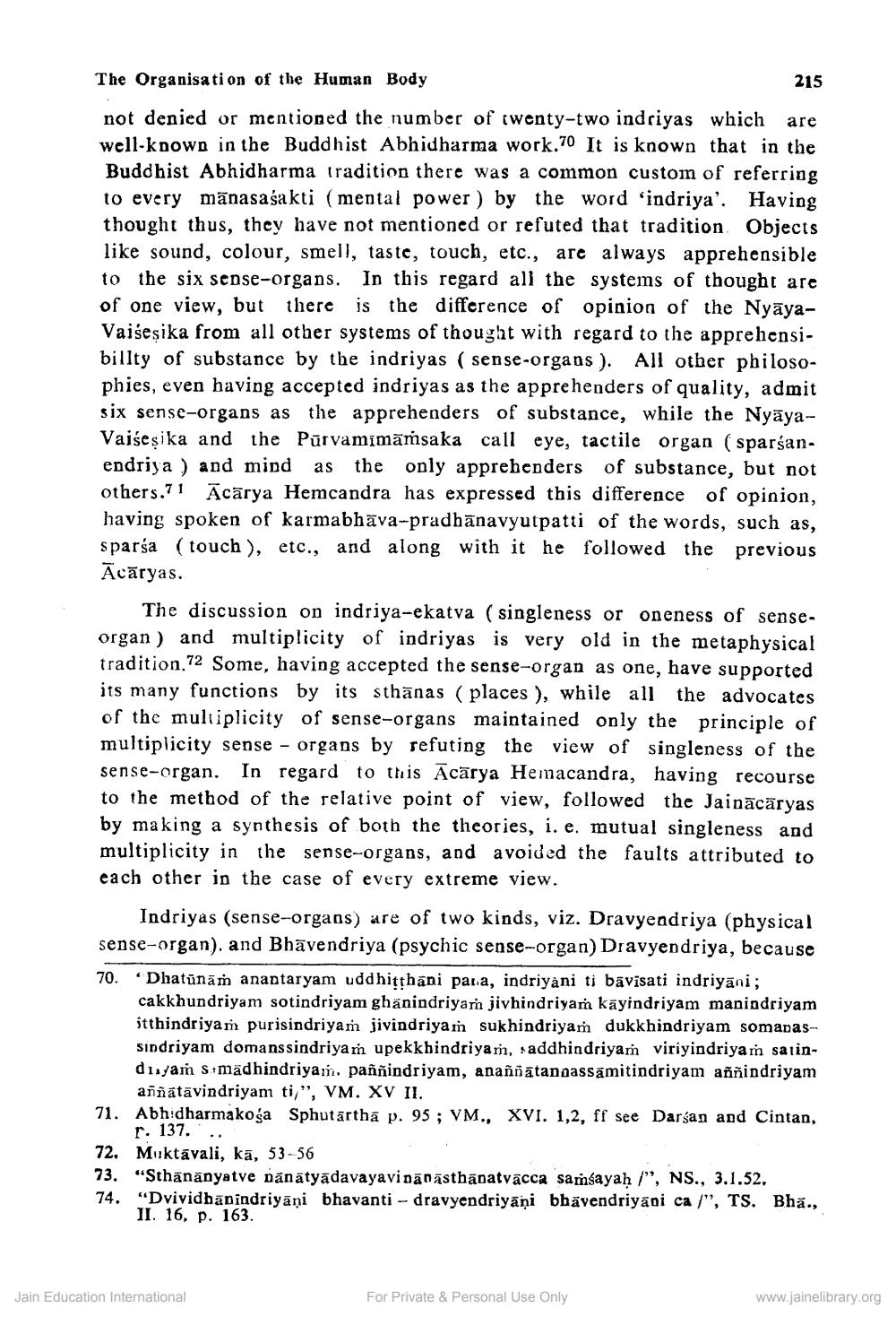________________
The Organisation of the Human Body
215
not denied or mentioned the number of twenty-two indriyas which are well-known in the Buddhist Abhidharma work.70 It is known that in the Buddhist Abhidharma tradition there was a common custom of referring to every mānasasakti (mental power) by the word 'indriya'. Having thought thus, they have not mentioned or refuted that tradition. Objects like sound, colour, smell, taste, touch, etc., are always apprehensible to the six sense-organs. In this regard all the systems of thought are of one view, but there is the difference of opinion of the NyāyaVaišesika from all other systems of thought with regard to the apprehensibillty of substance by the indriyas ( sense-organs ). All other philosophies, even having accepted indriyas as the apprehenders of quality, admit six sense-organs as the apprehenders of substance, while the NyāyaVaisesika and the Pūrvamımāṁsaka call eye, tactile organ (sparsanendriya ) and mind as the only apprehenders of substance, but not others.71 Ācārya Hemcandra has expressed this difference of opinion, having spoken of karmabhāva-pradhānavyutpatti of the words, such as, sparsa (touch ), etc., and along with it he followed the previous Ācāryas.
The discussion on indriya-ekatva (singleness or oneness of senseorgan) and multiplicity of indriyas is very old in the metaphysical tradition.72 Some, having accepted the sense-organ as one, have supported its many functions by its sthānas (places ), while all the advocates of the multiplicity of sense-organs maintained only the principle of multiplicity sense - organs by refuting the view of singleness of the sense-organ. In regard to this Acārya Hemacandra, having recourse to the method of the relative point of view, followed the Jainācāryas by making a synthesis of both the theories, i. e. mutual singleness and multiplicity in the sense-organs, and avoided the faults attributed to each other in the case of every extreme view.
Indriyas (sense-organs) are of two kinds, viz. Dravyendriya (physical sense-organ). and Bhāvendriya (psychic sense-organ) Dravyendriya, because 70. "Dhatūnām anantaryam uddhitthani pata, indriyani ti bāvisati indriyāni;
cakkhundriyam sotindriyam ghänindriyan jivhindriyam kāyindriyam manindriyam itthindriyam purisindriyam jivindriyam sukhindriyam dukkhindriyam somanassindriyam domanssindriyam upekkhindriyam, addhindriyam viriyindriyam salindunyam simadhindriya, paññindriyam, anaññātanpassāmitindriyam aññindriyam
aññātāvindriyam ti,", VM. XV II. 71. Abhdharmakosa Sphutártha p. 95 ; VM., XVI. 1,2, ff see Darsan and Cintan,
r. 137.... 72. Muktavali, kā, 53-56 73. “Sthānānyatve pánātyādavayavinālāsthanatvācca samsayah /", NS., 3.1.52, 74. "Dvividhapindriyani bhavanti - dravyendriyāni bhāvendriyani ca/", TS. Bhã.,
II. 16, p. 163.
Jain Education International
For Private & Personal Use Only
www.jainelibrary.org




